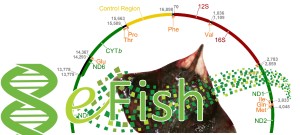 The Molecular Fisheries Laboratory at the University of Queensland has just released eFish.
The Molecular Fisheries Laboratory at the University of Queensland has just released eFish.
eFish is a virtual library of genomic data for marine fish species. It is a major part of the project “Genome diversity of elasmobranchs of the Pacific Ocean Rim: Bioinformatics for conservation and management of populations” led by Dr Carlos Bustamante at the MFL.
eFish is the genomic database repository of the Molecular Fisheries Laboratory and is hosted by The University of Queensland. eFish stores data produced by MFL projects and has been created to ensure fair access and use of this raw data. Re-use arrangements can be granted with a Creative Commons baseline licence, which grants permission free-of-charge to create non-commercial, no derivative works.
Carlos Bustamante says
“Our Lab is at the forefront of emerging technologies for whole‐genome descriptions, especially in marine fishes. Only 10 whole mitochondrial genomes of marine fishes have been produced in Australia, and the majority have been assembled within the Molecular Fisheries Laboratory”.
According to Jenny Ovenden
“Most studies of intraspecific genetic diversity have examined information from a single locus. Although the problem of inferring a species evolutionary history based on one gene has been addressed both empirically and theoretically, researchers still often make conclusions regarding evolutionary history based solely on mitochondrial sequence data, relying on the assumption that variation in mtDNA and nDNA are representative of variation in the whole genome. There are many reasons why this assumption might be violated, for example, demographic fluctuations, or hybridization can cause different loci to show dramatically different patterns of diversity”.
eFish capitalises on UQ’s research strengths in marine science, marine fishes ecology, fisheries‐related molecular genetics, genome sequencing and bioinformatics infrastructure, and will extend Next‐Generation Sequencing technologies into the broader scientific community, providing an innovative and interdisciplinary platform to harvest key data from the genome diversity across marine fish species.
